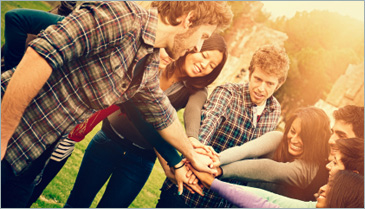 By Carlin Flora
By Carlin Flora
time.com
Back in college, my dorm-mate Sofia and I invented a ritual we called “Power Wednesdays.” Every week, we headed to the campus fitness center for a workout, and then to the library for four hours of hard studying. We would stride back to our dorm with a huge feeling of accomplishment. But that uplifting cocktail of virtuousness, productivity and sore muscles — rewarding as it was — wasn’t what kept us repeating Power Wednesdays. Our real motivation was each other’s company.
I’ve been immersed in the study of friendship for the past several years, and among the many things I’ve learned, one idea stands out: If you truly want to change some aspect of your life, developing friendships with people who aspire to the same goals as you do — like I did with Sofia 15-plus years ago — can lead to more successful endeavors than embarking on solitary efforts.
(MORE: A New Way to Think About New Year’s Resolutions)
Shortly after we make a decision to change our behavior, we often sense a softening of what at first felt like ironclad conviction. We chastise ourselves for our inability to summon motivation and return to the poor habits we’re trying to break to comfort us, actively undermining our goals. What a disheartening cycle. But research shows that having friends with the same goal can interrupt that cycle.
Researchers James Fowler and Nicholas Christakis have demonstrated that weight loss (and gain) spreads through friend groups, most likely via a process of altered norms. For example, if you meet your friends at an all-you-can-eat brunch every Sunday, but then one pal starts to beg off after starting a diet, you might suddenly question whether the practice is best for you. It’s not that you’ll necessarily adopt your friend’s new habits right away, but the seed will be planted. If you want to continue to feel close to her, you might even start tweaking your own routines (perhaps unconsciously) to align them more with hers.
The same type of scenario is at play with addiction recovery programs like Alcoholics Anonymous. While the success of these programs is difficult to evaluate overall, those who are helped by them tend to credit the friendships they make as a key factor in success. Public health researchers often point out the futility of putting a drug addict back into the same social environment after treatment, where it’s nearly impossible to resist getting high with the same pals in the same places. Forging new friendships with people who are also determined to stay clean, however, establishes different patterns and helps fill the emotional holes that form when one abandons a way of life.
(MORE: How to Make New Year’s Resolutions Stick)
Friends can help you reinforce individual willpower. In The Power of Habit, Charles Duhigg recommends replacing the cues that trigger, and the rewards that follow, bad behaviors with new, healthier ones. The cue and reward of a real person knocking on your door for a joint jog, and a stimulating talk over coffee afterwards, is a particularly alluring replacement for whatever previously sucked you into sedentary TV watching.
In a recent New York Times column, “How People Change,” David Brooks noted that, “There’s a trove of research suggesting that it’s best to tackle negative behaviors obliquely, by redirecting attention toward different, positive ones.” Investing in fulfilling friendships with those who have the values and habits you admire will lift you up to those friends’ level more easily.
The desire to be with, be like, and be liked by friends is primal. We’re all built to seek out strong bonds with friends on whom our very survival might have once been dependent. While we don’t necessarily need friends to help hunt or fight off predators these days, most of us probably still feel like we can’t live without them. Tap into that deep-down social motivation and you’ll not only be primed for success, you’ll take pleasure in the proverbial journey.
MORE: Lessons from the Lab: How to Make Group Projects More Successful
Read more: http://ideas.time.com/2013/01/16/how-friendship-makes-you-more-successful/#ixzz2T9RXeJsY




